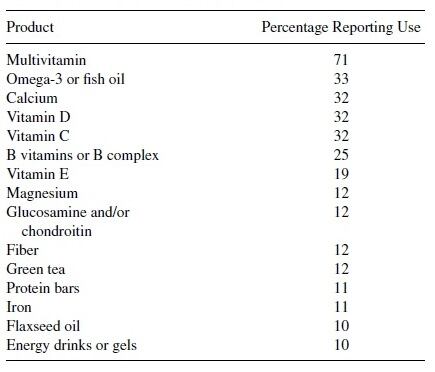Data from surveys commissioned by the Council for Responsible Nutrition (CRN) and performed by Ipsos Public Affairs indicate that between 64 and 69% of US adults were supplement users between 2007 and 2011, with 48-53% being ‘regular’ users, levels equivalent to the overall prevalence reported in NHANES.
“What the data tells us,” said Judy Blatman, Sr communications, CRN, and one of the study’s co-authors, “is that dietary supplement usage is a mainstream practice, and, contrary to some assertions, supplement users do not use these products as a license to slack off on eating right or exercising, but instead are health conscious individuals trying to do all the right things to be healthy. They are more likely than nonusers to try to eat a balanced diet, visit their doctor regularly, get a good night’s sleep, exercise regularly, and maintain a healthy weight.”
Multivitamins – still number one
Data from the 2011 survey indicated that, among supplement users, multivitamins were the most commonly used supplement (71%), followed by omega-3 or fish oil (33%), calcium (32%), vitamin D (32%), and vitamin C (32%). Vitamin or mineral supplements were used by 67% of all respondents in 2011, specialty supplements by 35%, botanicals by 23%, and sports supplements by 17%.

However, the percentage of respondents who said that they regularly used only a multivitamin, as opposed to a variety of supplements, declined from 24% to 17%, and the decrease from 2007 to 2008 was statistically significant.
The 2011 data also indicated that supplement use increases with age and is higher in women than in men.
The reasons most often cited for supplement use were for overall health and wellness (58%) and to fill nutrient gaps in the diet (42%). Supplement users were significantly more likely than nonusers to say that they try to eat a balanced diet, visit their doctor regularly, get a good night's sleep, exercise regularly, and maintain a healthy weight.
“This new review adds to the literature about usage patterns of dietary supplement users,” said Annette Dickinson, PhD, corresponding author and a consultant for CRN. “The NHANES data is of course invaluable, but it only asks respondents about their dietary supplement usage over a 30-day period. The CRN/Ipsos data included regular, occasional and seasonal use throughout the year, which more realistically captures the full scope of dietary supplement utilization.”
Part of a healthy lifestyle
The review also challenged the perception that dietary supplement use is related to a consumer’s desire to reverse the effects of poor diet and lifestyle, while others have speculated that supplement users may engage in risky or unhealthy behaviors believing that the supplements are some kind of safety net.
“Overall, [however,] the data support the conclusion that dietary supplement users are people seeking to improve their health, not only by using dietary supplements but by attempting to incorporate a constellation of healthy habits into their overall lifestyle,” wrote Dr Dickinson and her co-authors. “These are rational choices to make, especially in the context of today’s emphasis on encouraging consumers to take more responsibility for their health.”
Source: Journal of the American College of Nutrition
2014, Volume 33, Issue 2, Pages 176-182
“Consumer usage and reasons for using dietary supplements: report of a series of surveys”
Authors: A. Dickinson J. Blatman, N. El-Dash, J.C. Franco
